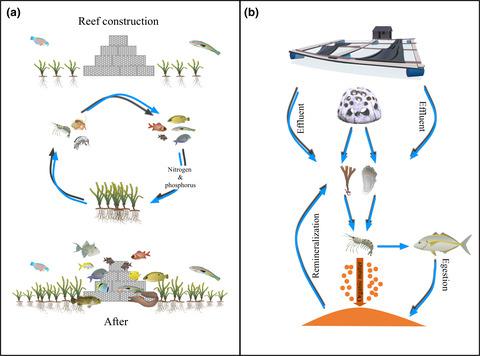当前位置:
X-MOL 学术
›
J. Appl. Ecol.
›
论文详情
Our official English website, www.x-mol.net, welcomes your feedback! (Note: you will need to create a separate account there.)
An ecosystem ecology perspective on artificial reef production
Journal of Applied Ecology ( IF 5.7 ) Pub Date : 2020-08-20 , DOI: 10.1111/1365-2664.13748 Craig A. Layman 1 , Jacob E. Allgeier 2
中文翻译:

人工鱼礁生产的生态系统生态学观点
更新日期:2020-08-20
Journal of Applied Ecology ( IF 5.7 ) Pub Date : 2020-08-20 , DOI: 10.1111/1365-2664.13748 Craig A. Layman 1 , Jacob E. Allgeier 2
Affiliation

|
- Artificial reefs are used around the world for many purposes, including widespread deployment to increase fishery yields. These reefs are well‐studied from a direct fisheries‐based perspective, drawing largely on traditional theory and methodological approaches from population and community ecology.
- Here we provide an alternative perspective using basic tenets of ecosystem ecology. We focus largely on primary production, as this ecosystem process necessarily constrains the secondary production of fish and invertebrates.
- We use this ecosystem ecology viewpoint to examine the long‐standing attraction/production question—do artificial reefs support ‘new’ fish production or simply attract individuals from other habitats? Central to this discussion is identifying ecological thresholds and self‐reinforcing feedbacks. For example, biological or physical processes may facilitate reaching nutrient supply thresholds where fundamental ecological dynamics are shifted, such as enhanced seagrass allocation of resources to above‐ground plant structures following aggregation of fish around reefs.
- Synthesis and applications. We propose that the scope for enhanced primary productivity (or other accelerated ecosystem processes) is an under‐utilized guideline that can be used to prioritize artificial reef deployment as part of broader coastal management programmes. Such an ecosystem ecology perspective may provide new insights into the ecological role of artificial reefs and guide the optimization of their deployment and management.
中文翻译:

人工鱼礁生产的生态系统生态学观点
- 人工鱼礁在世界范围内用于许多目的,包括广泛部署以增加渔业产量。从直接渔业角度对这些珊瑚礁进行了充分研究,并主要借鉴了人口和社区生态学的传统理论和方法学方法。
- 在这里,我们提供了使用生态系统生态学基本原理的另一种观点。我们主要关注初级生产,因为这种生态系统过程必然会限制鱼类和无脊椎动物的次级生产。
- 我们使用这种生态系统生态学观点来研究长期存在的吸引/生产问题-人工鱼礁是否支持“新”鱼的生产或仅仅是吸引其他栖息地的个体?讨论的重点是确定生态阈值和自我强化的反馈。例如,生物或物理过程可能有助于达到基本生态动力学发生变化的营养供给阈值,例如,鱼在礁石周围聚集后,海草对地上植物结构的资源分配增加。
- 综合与应用。我们建议提高初级生产力(或其他加速的生态系统过程)的范围是未得到充分利用的指南,可将其作为更广泛的沿海管理计划的一部分来优先考虑人工鱼礁的部署。这样的生态系统生态学观点可以为人工鱼礁的生态作用提供新的见解,并指导其优化部署和管理。


























 京公网安备 11010802027423号
京公网安备 11010802027423号